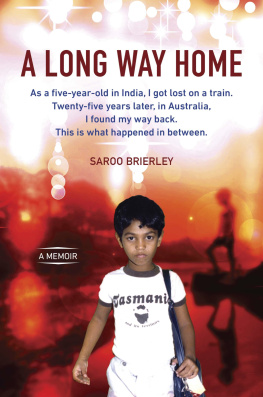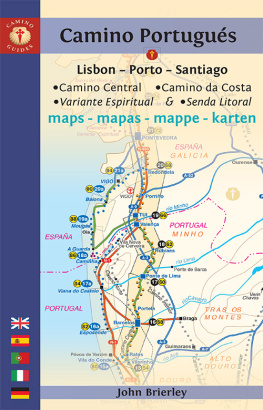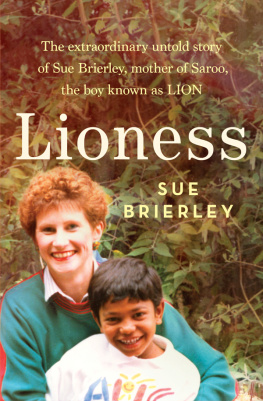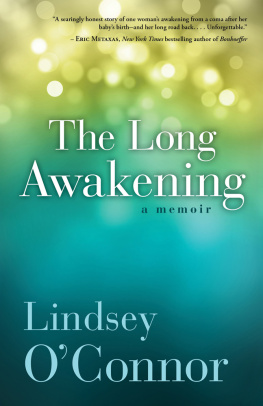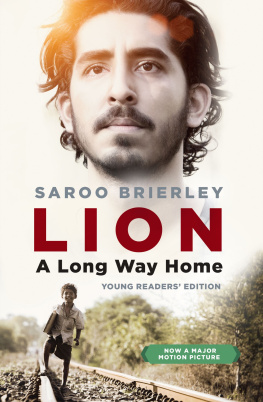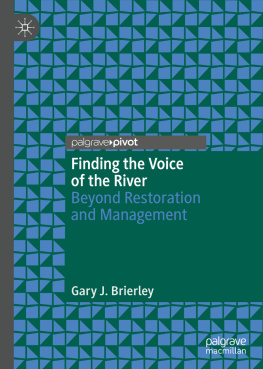Saroo Brierley - A long way home : a memoir
Here you can read online Saroo Brierley - A long way home : a memoir full text of the book (entire story) in english for free. Download pdf and epub, get meaning, cover and reviews about this ebook. year: 2013, publisher: Penguin Group, genre: Non-fiction. Description of the work, (preface) as well as reviews are available. Best literature library LitArk.com created for fans of good reading and offers a wide selection of genres:
Romance novel
Science fiction
Adventure
Detective
Science
History
Home and family
Prose
Art
Politics
Computer
Non-fiction
Religion
Business
Children
Humor
Choose a favorite category and find really read worthwhile books. Enjoy immersion in the world of imagination, feel the emotions of the characters or learn something new for yourself, make an fascinating discovery.
- Book:A long way home : a memoir
- Author:
- Publisher:Penguin Group
- Genre:
- Year:2013
- Rating:5 / 5
- Favourites:Add to favourites
- Your mark:
- 100
- 1
- 2
- 3
- 4
- 5
A long way home : a memoir: summary, description and annotation
We offer to read an annotation, description, summary or preface (depends on what the author of the book "A long way home : a memoir" wrote himself). If you haven't found the necessary information about the book — write in the comments, we will try to find it.
A long way home : a memoir — read online for free the complete book (whole text) full work
Below is the text of the book, divided by pages. System saving the place of the last page read, allows you to conveniently read the book "A long way home : a memoir" online for free, without having to search again every time where you left off. Put a bookmark, and you can go to the page where you finished reading at any time.
Font size:
Interval:
Bookmark:



G. P. PUTNAMS SONS
Publishers Since 1838
Published by the Penguin Group
Penguin Group (USA) LLC
375 Hudson Street
New York, New York 10014

USA Canada UK Ireland Australia New Zealand India South Africa China
penguin.com
A Penguin Random House Company
Copyright 2013 by Saroo Brierley
First published in the United States by G. P. Putnams Sons 2014
Penguin supports copyright. Copyright fuels creativity, encourages diverse voices, promotes free speech, and creates a vibrant culture. Thank you for buying an authorized edition of this book and for complying with copyright laws by not reproducing, scanning, or distributing any part of it in any form without permission. You are supporting writers and allowing Penguin to continue to publish books for every reader.
All images used courtesy of Saroo Brierley, 2014 Saroo Brierley, unless otherwise noted in the text.
Library of Congress Cataloging-in-Publication Data
Brierley, Saroo.
A long way home : a memoir / Saroo Brierley with Larry Buttrose.
p. cm.
ISBN 978-0-698-15509-1
1. Brierley, Saroo. 2. Brierley, SarooFamily. 3. Brierley, SarooTravelIndia. 4. East IndiansAustraliaBiography. 5. Adopted childrenAustraliaTasmaniaBiography. 6. BirthparentsIndiaIdentification. 7. Intercountry adoptionAustraliaTasmania. 8. Intercountry adoptionIndia. 9. Hobart (Tas.)Biography. 10. Kolkata (India)Biography. I. Buttrose, Larry, 1952 II. Title.
CT2808.B67A3 2014 2014003745
920.00920946dc23
Penguin is committed to publishing works of quality and integrity. In that spirit, we are proud to offer this book to our readers; however, the story, the experiences, and the words are the authors alone.
Version_1
For Guddu
T heyve gone.
Ive been thinking about this day for twenty-five years. Growing up half a world away, with a new name and a new family, wondering whether I would ever see my mother and brothers and sister again. And now here I am, standing at a door near the corner of a run-down building in a poor district of a small, dusty town in central Indiathe place I grew upand no one lives here. Its empty.
The last time I stood on this ground, I was five years old.
The door, its hinges broken, is so much smaller than I remember it as a childnow I would have to bend over to fit through it. Theres no point in knocking. Through the window, as well as some gaps in the familiar crumbling brick wall, I can see into the tiny room my family shared, the ceiling only a little higher than my head.
This was my worst fear, so paralyzing that I suppressed it almost completelythat once I finally found my home, after years of searching, my family wouldnt be in it.
Not for the first time in my life, Im lost and I dont know what to do. This time Im thirty, Ive got money in my pocket and a ticket to the place I now call home, but I feel just like I did on that railway platform all those years agoits hard to breathe, my mind is racing, and I wish I could change the past.
Then the neighbors door opens. A young woman in red robes comes out of the better-maintained flat next door, holding a baby in her arms. Shes curious, understandably. I look Indian, but my Western clothes are probably a little too new, my hair carefully styledIm obviously an outsider, a foreigner. To make matters worse, I cant speak her language, so when she speaks to me, I can only guess that shes asking me what I want. I remember barely any Hindi, and Im not confident about how to pronounce the little I do know. I say, I dont speak Hindi, I speak English, and Im astonished when she responds, I speak English, a little. I point at the abandoned room and recite the names of the people who used to live thereKamla, Guddu, Kallu, Shekilaand then I point to myself and say, Saroo.
This time the woman remains silent. Then I remember something Mum gave me back in Australia, for just this situation. I scrabble around in my daypack and pull out a page with color photographs of me as a child. Again I point to myself, and then say little as I point to the boy in the photographs. Saroo.
I try to remember who lived next door to us when this was my home. Was there a little girl who could now be this woman?
She stares at the page, then at me.
Im not sure if she understands, but this time she speaks, in hesitant English.
People... not live here... today, she says.
Although she is only confirming what I know, to hear her say it aloud hits me hard. I feel dizzy. Im left standing there in front of her, unable to move.
Ive always known that even if I managed to find my way back here, my family might have moved. Even in my short time with them, they had moved here from another place. Poor people often dont have much say in where they live, and my mother used to have to take whatever work she could get.
These are the thoughts that start coming out of the box Ive put them in. The other possibilitythat my mother is deadI jam back inside.
A man who has noticed us approaches, so I start my mantra over again, reciting the names of my mother, Kamla, my brothers, Guddu and Kallu, my sister, Shekila, and me, Saroo. He is about to say something when another man wanders up and takes over. Yes? How can I help? he says in clear English.
This is the first person Ive been able to talk to properly since I arrived in India, and my story comes tumbling out quickly: I used to live here when I was a little boy, I went off with my brother and got lost, I grew up in another country, I couldnt even remember the name of this place, but now Ive found my way back here, to Ganesh Talai, to try to find my mother, my brothers, and my sister. Kamla, Guddu, Kallu, Shekila.
He looks surprised at the story, and I recite the family names yet again.
After a moment, he says, Please wait here. Ill be back in two minutes.
My mind races with possibilitieswhat has he gone to get? Someone who might know what happened to them? An address, even? But has he understood who I am? I dont have to wait long before hes back. And he says the words Ill never forget:
Come with me. Im going to take you to your mother.
Remembering
W hen I was growing up in Hobart, I had a map of India on my bedroom wall. My mummy adoptive motherhad put it there to help me feel at home when I arrived from that country at the age of six to live with them in 1987. She had to teach me what the map representedI was completely uneducated. I didnt even know what a map was, let alone the shape of India.
Mum had decorated the house with Indian objectsthere were some Hindu statues, brass ornaments and bells, and lots of little elephant figurines. I didnt know then that these werent normal objects to have in an Australian house. She had also put some Indian printed fabric in my room, across the dresser, and a carved wooden puppet in a brightly colored outfit. All these things seemed sort of familiar, even if I hadnt seen anything exactly like them before. Another adoptive parent might have made the decision that I was young enough to start my life in Australia with a clean slate and could be brought up without much reference to where Id come from. But my skin color would always have given away my origins, and anyway, she and my father chose to adopt a child from India for a reason, as I will go into later.
Font size:
Interval:
Bookmark:
Similar books «A long way home : a memoir»
Look at similar books to A long way home : a memoir. We have selected literature similar in name and meaning in the hope of providing readers with more options to find new, interesting, not yet read works.
Discussion, reviews of the book A long way home : a memoir and just readers' own opinions. Leave your comments, write what you think about the work, its meaning or the main characters. Specify what exactly you liked and what you didn't like, and why you think so.

